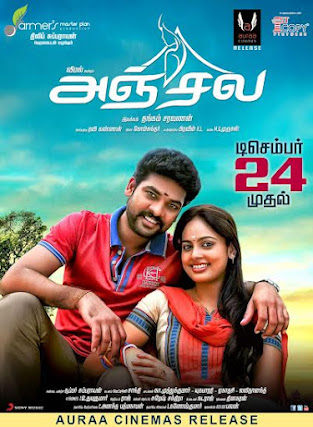Anjala (2016) - Tamil Movie Review
Director:
- Thangam Saravanan
Cast:
- Vimal as Veerasamy
- Nikki Galrani as Radhika
- Soori as Nalla Thambi
- Samuthirakani as Natarajan (Veerasamy's father)
- Thambi Ramaiah in a supporting role
- M. S. Bhaskar in a supporting role
- Ravi Mariya in a supporting role
Genre: Drama, Romance
Plot Summary:
Anjala is a rural drama that centers around Veerasamy (Vimal), a young man living in a village, and his relationship with his family, friends, and his love interest, Radhika (Nikki Galrani). The film explores the complexities of village life, with its rustic charm, social dynamics, and the importance of community. Veerasamy is a kind-hearted man who runs a tea shop with his father Natarajan (Samuthirakani). His life takes a turn when he falls in love with Radhika, a woman from a different social class.
However, their love faces several obstacles, including disapproval from her family and societal pressures. The film follows Veerasamy’s efforts to bridge the gap between his love and his responsibilities, with a strong emphasis on family values, tradition, and personal sacrifice. Alongside this, the film deals with the dynamics of village life and the importance of taking care of one’s roots.
Review:
Storyline and Execution:
Anjala presents a heartwarming story set in a rural backdrop, with a focus on family, love, and tradition. The film’s strength lies in its portrayal of village life and the relationships within a close-knit community. The storyline, while not entirely unique, offers a familiar yet engaging look at the challenges faced by individuals in rural settings. The rural elements, including the tea shop business and village politics, add authenticity to the narrative.
While the film does have its predictable moments, it compensates with its emotional core and relatable characters. The film also delves into themes of family loyalty, love against societal odds, and personal sacrifice, which give it emotional depth. The narrative is woven in a way that doesn’t feel rushed, allowing the audience to connect with the characters and their motivations.
Performances:
Vimal, who is known for his roles in rural dramas, delivers a solid performance as Veerasamy. His portrayal of a loving son and a hopeful lover is sincere, and his comic timing adds a nice touch to the film. Nikki Galrani plays Radhika, a role that demands both innocence and determination. While her performance is decent, the character’s development could have been stronger.
Soori, known for his comedy roles, shines in a supporting comedic role as Nalla Thambi. His humor brings some lightness to the otherwise emotional film. Samuthirakani’s portrayal of Veerasamy’s father, Natarajan, is another strong point. He adds gravitas to the film with his mature performance, highlighting the importance of family values.
Thambi Ramaiah and M. S. Bhaskar, both seasoned actors, provide solid support in their respective roles, contributing to the film’s emotional and comedic balance.
Direction:
Thangam Saravanan’s direction focuses heavily on the rural setting and familial bonds. He successfully brings out the nuances of village life while keeping the story relatable to a broader audience. The director takes a traditional approach, with the film featuring themes of love, sacrifice, and social pressures. While the film doesn’t break new ground, the direction brings out the sincerity of the story, and the pacing is steady throughout.
Cinematography and Music:
The cinematography by Velraj is one of the film’s highlights, capturing the essence of rural Tamil Nadu beautifully. The visuals complement the film’s themes and provide a strong sense of place, immersing the audience in the village atmosphere. The rural landscapes, village festivals, and rustic settings add authenticity to the story.
The music, composed by Radhan, includes songs that are in tune with the film’s tone. Tracks like "Yaarukku Yaaru" are memorable, adding emotional depth to key moments in the film. The background score effectively enhances the mood, complementing both the light-hearted and emotional scenes.
Critical Reception:
Anjala received positive reviews for its sincere storytelling and the performances of the lead actors. While the film follows a familiar narrative arc, critics appreciated the film's emotional quotient and the performances, particularly Vimal’s portrayal of Veerasamy. The film’s rural setting and its portrayal of village dynamics were praised for their authenticity, and the film was seen as a heartfelt tribute to the rural way of life.
However, some critics noted that the film’s pace could have been tighter, and certain moments felt predictable. Despite these minor drawbacks, Anjala was generally well-received for its simplicity, sincerity, and relatable characters.
Final Verdict:
Anjala is a rural drama that shines due to its heartfelt performances, emotional depth, and authentic portrayal of village life. While the story may not offer much in terms of novelty, the film's charm lies in its grounded, relatable characters and themes of love, family, and sacrifice. If you're a fan of rural dramas that focus on family values and relationships, Anjala will resonate with you.
The film’s emotional core, combined with solid performances from the cast, makes it an enjoyable and touching watch for anyone who enjoys family-oriented cinema with a rural backdrop.


Post a Comment